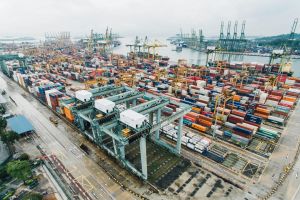International Trade Finance: Types, Benefits & How It Works

Whether you are running a small or big business, you always look for ways to expand your business’s export and want buyers to import your product first. Here, when trade finance comes into the scenario making it easy to run an international business smoothly around the different corners of the world. But what is financing of foreign trade or International trade and finance and how does it help importers & exporters? Let’s find out:
What Is International Trade Finance?
International trade finance meaning: "The financial activities involved in Global trade transactions, such as the import and export of goods and services, are referred to as international trade finance. These financial activities can include a variety of tasks such as financing, risk management, and payment processing." Or
Global trade finance instruments are simply the financial help provided by banks or financial institutions in the field of Global trade through various types of financial instruments like bank guarantee, letter of credit etc. These varieties of financial instruments and products helps importer & exporters to execute business transactions without facing any financial inconveniences. It bridges the gap between importers & exporters by adding a third party and covers activities like issuance of letter of credit, lending or forfaiting, etc.
The parties involved are:
International trade finance transactions involve multiple parties, each with their own set of roles and responsibilities. In most international trade finance transactions, the following parties are involved:
Providers:
Both imports and exporters need foreign trade finance services to help them cover their business expenses. Apart from banks, various financial institutions offer safe and reliable import & export finance services for their corporate clients.
1. Financial Institutions: Many financial institutions specialize in handling different financial products for their corporate clients including investments, Bank Guarantee, loans, Letter of credit, deposits, and more. The financial institutions with a legal operating license provides advanced funds to corporations that require funding for their ongoing business deals.
2. Financial Intermediaries - Apart from above financial institutions, there are many Financial intermediaries like agents and parties that work with financial corporates and help you in your international trade transactions. It includes insurance brokers who can help you find insurance providers.
3. Traditional Commercial Banks - Both small and larger, domestic or multinational banks like Emerio Banque offer various kinds of international trade finance services to corporates from across the world.
Users:
International trade finance is quite a large industry and covers many sectors. The users of foreign trade finance are:
- * Importer
- * Exporter
- * Manufacturer
- * Trader
- * Producers
How Does It Work?
The process of financing international trade includes various trading intermediaries such as banks, and other financial institutions to facilitate different financial transactions between importer and exporter. They act as third parties and remove the payment & supply risks between buyer and seller. The exporter gets the receivables or payment as per the agreement while the importer can extend credit to complete the trade order.
Global trade financing covers a vast range of different types of trade finance products including Letters of Credit, bank guarantee, lending, forfaiting, export credit, and factoring.
Types of International Trade Finance
The nature and purpose of Global trade finance instruments is completely different from conventional financing or credit issuance. General financing international trade is widely used to manage solvency or liquidity but financing foreign trade can be used to protect both buyers and sellers from global trade’s risks.
Here are some of the main types of trade finance instruments, Let’s find out:
1. Letter of Credit - In foreign trade finance, a letter of credit is a proof of funds issued by any bank or financial institution on the behalf of the buyers, guaranteeing that the sellers will get the full payment in exchange for their delivered good & services on-time. But in case if the buyers are unable to do so, the bank will pay to the seller in part or full according to the terms and conditions of issued letter of credit. Here are some of the most commonly asked questions and answers on letters of credit:
2. Bank Guarantee - It is also issued by a bank where it acts as a guarantor in case the importer or exporter is unable to fulfill the terms and conditions of the contract. Checkout Faq's on Bank Guarantee here!
3. Factoring - When the companies are paid on the base of the percentage of their accounts receivables. The exporter sells their invoices to the trade financier at a discounted rate. Then the factor sells it to the importer and gets the full price for the product.
4. Export Credit - This can be delivered to exporters as trade business working capital. Once the amount is received from the buyer, the export packing credit amount can be adjusted, and then the loan will be closed against the order.
5. Forfaiting - Here, the exporter sells all of their accounts to a forfaiter at a discounted rate in an exchange for the cash.
6. Insurance - You can use for shipping and the delivery of goods as well as to protect the exporter from non-payment by the buyer.
How Does It Help In My Business?
Global trade finance instruments can help reduce the risks involved in international trade by bridging the gap between buyers and sellers and securing funds required to purchase the goods etc. There is no doubt that an exporter needs an importer to pay in advance for an export shipment to avoid the risks of nonpayment or refuse to pay for the goods. The appropriate solution to this problem is to provide a proof of funds to the exporter’s bank presenting the documents of the shipment. It guarantees the full payment to the seller in case the buyer fails to do so.
Benefits of International Trade Finance
• Supply chain movement/Ready funds:
Supply chain flow is the main justification for businesses to partner with a reputed international trade finance firm. If you choose to obtain finance from one of these businesses, the money is nearly immediately available! If you have a market that is screaming for your product, having the finance you need when you need it helps ensure that you don't miss any opportunities that come your way and that you don't keep them waiting and miss out. Last but not least, this form of loan does not appear on your company's record as debt but rather as working capital, which presents far better.
• Security and knowledge:
It could be a little outside of your typical course of business to do several business dealings with overseas corporations. International trade finance companies with experience have worked with both domestic and foreign enterprises in the real world for many years. If you merely want to try things on your own and only require occasional support, they can give you all the advice you need to succeed as well as peace of mind.
• Convenience:
It will be quite challenging for a typical bank or many other traditional lenders to lend money to your firm if you are new to the international trade financing market and don't have a large portfolio with a long history. Companies that specialize in international trade finance do not need a lot of paperwork to begin started. Typically, the contracts are brief, precise, and to the point. The contracts are written so there won't be any unforeseen costs down the road. The contract states exactly what is happening.
• Flexibility:
The inability to implement a great concept is one of the worst things that can happen. Or, a chance opportunity knocking at your door, but you are unable to take advantage of it due of a lack of funds. Companies that finance international trade are present specifically for that purpose. These businesses give your firm fresh life and provide it lots of room to expand and take advantage of business possibilities as they present themselves. These businesses' adaptability enables you to pay a supplier in any necessary local currency. Additionally, the installment payments can be modified to fit the demands of the business. Finally, some of the flexible repayment plans allow for extensions of up to four months.
Other Benefits of International Trade Finance:
* It helps different companies to obtain funds to facilitate their international transactions smoothly. The companies can receive cash payments based on the accounts receivables in case of factoring or they can also consider letters of credit.
* Companies can improve or grow their global business and generate revenue through trade.
* It helps companies reduce the risks of financial nonpayment.
* It also strengthens the relationship between buyers and sellers.
* Buyers can request a higher volume of stock or place larger orders with the suppliers.
How is International Trade Finance different from other Financing Options?
The financial tools and goods used by businesses to support international trade and commerce are referred to as trade finance. Importers and exporters can more easily conduct business through trade thanks to trade finance. The term "trade finance" denotes to a comprehensive category of financial instruments used by businesses and banks to streamline trade operations.The financial activities associated with international trade transactions, such as the import and export of goods and services, are referred to as international trade finance.
The tasks involved in these financial activities may range from funding to risk management to payment processing. The financial assistance offered by banks or other financial institutions in the area of international commerce through various financial instruments, such as bank guarantees, letters of credit, etc., is known as global trade finance. These different financial solutions and instruments enable importers and exporters to carry out commercial transactions without experiencing any financial hardships. By including a third party, it fills the gap between importers and exporters and includes activities like letter of credit issuing, lending, forfaiting, etc.
International trade financing differs significantly from conventional finance or credit issuance in a few important ways. While broad finance is used to manage solvency or liquidity, financing for international trade may not always be an indication that a buyer is strapped for cash or liquidity.
On the contrary, the particular hazards related to global trade, such as altering exchange rates, political unrest, a party's creditworthiness, or problems with non-payment, can be managed by using trade finance.
In order to ease numerous financial transactions between importers and exporters, trade finance involves a variety of trade intermediaries, such as banks and other monetary institutions. They take on the role of a third party and take on the supplier's and client's responsibilities minimizing any risk.
The contract states that the importer may extend credit to execute the trade order while the exporter obtains receivables or payment. Several of the many various types of activity that fall under the wide category of trade finance include letters of credit, export credit, lending, forfaiting, factoring, etc.
Who Uses International Trade finance?
In order to ease numerous financial transactions between importer and exporter, the process of financing international trade involves a variety of trading middlemen, such as banks and other financial organizations. They take on the role of a third party and eliminate the risk of payment and supply between the customer and vendor. According to the agreement, the exporter receives the receivables or payment, and the importer may provide credit to complete the trade order.Letters of Credit, bank guarantees, lending, forfaiting, export credit, and factoring are just a few examples of the many various forms of trade finance products that fall under the umbrella of Global trade financing.
Transactions involving global trade financing involve a number of stakeholders, each of whom has a distinct set of duties and responsibilities. The following parties are typically involved in transactions involving international trade finance:
1. Importers: The people or organizations that purchase goods or services from overseas suppliers and import them into their own country. The importer is in responsible of making all arrangements for the items or services' delivery and shipping as well as their payment.
2. Exporters: Those who sell goods or services to overseas clients, buyers, or importers and receive payment for the products or services they have rendered.
3. Forwarders of freight: Focus on organizing the shipping of goods from one nation to another. They are capable of managing every facet of shipping, including customs clearance, insurance, and paperwork.
4. Banks: In operations involving the financing of foreign trade, banks play a crucial role. They can provide funding for overseas commerce to importers and exporters in addition to processing payments and granting letters of credit, as well as other financial services that support international trade.
5. Insurance: To protect exporters from the danger of nonpayment by foreign clients, insurance companies offer trade credit insurance. Additionally, they can provide extra insurance to protect against other risks associated with international trade, such as damage to goods during shipping.
Importers, exporters, merchants, producers, and manufacturers are among the parties that use international trade finance.
How Trade Financing Reduces Risk?
Trade finance can lower the risk associated with international trade by balancing the conflicting requirements of an importer and an exporter.An exporter could request an advance payment from the importer to reduce the likelihood of non-payment. But this can result in non-delivery.
The importer's bank may send an LC to the exporter's bank to address this issue.
Payment is assured after the exporter shows evidence of shipment. By transferring payment obligations to the buyer's bank via the LC, the buyer's financial stability is ensured. As a result, commerce is facilitated and the participants to the transaction become more trustworthy.
By securing payment from the buyer's bank and assuring the prompt transportation of products, trade finance can improve your company's productivity and boost your revenue.
Because there are fewer payment and shipment delays, importers and exporters may better manage their cash flow.
By providing access to capital that might not otherwise be possible, trade financing promotes competitiveness.
It also gives businesses the tools to develop new products or enter new markets, which can help them stay competitive.
Through the reduction of financial risks and the release of capital from the supply chain, trade finance promotes international trade.
Trade finance provides importers and exporters with a variety of financial tools to enable them to conduct international business with confidence, promoting economic growth and development.
Trade finance can be extremely helpful in eliminating working capital shortages and providing your business with the cash flow it needs to maintain operations. This method of financing entails a financial intermediary buying your company's receivables in exchange for cash up front and payment from your clients at invoice maturity.
With this financial assistance, your business will be able to meet the extended payment terms demanded by clients while still paying staff and suppliers on schedule. The financing agreement ensures that your supply chain partners have the liquidity to produce raw materials and cover their own costs, which not only pleases your consumers but also keeps them pleased.






